For avid hunters and outdoor enthusiasts, squirrel hunting with a canine companion can be an exhilarating and rewarding experience. The right dog can make all the difference in your hunting success, transforming a challenging pursuit into an efficient and enjoyable adventure. In this comprehensive guide, we'll explore the top five dog breeds that excel in squirrel hunting, providing you with valuable insights to help you choose the perfect furry partner for your next hunting expedition.
1. Mountain Cur
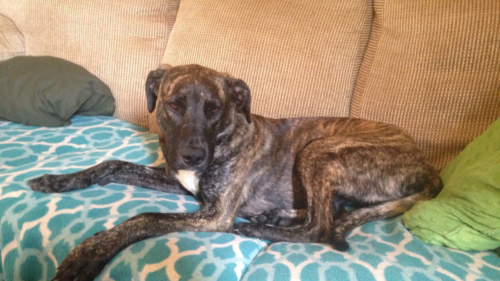
The Mountain Cur stands out as a premier choice for squirrel hunting, combining strength, agility, and an unwavering dedication to the hunt.
Key Characteristics:
- Size: Medium to large (30-60 pounds)
- Coat: Short and dense
- Temperament: Loyal, intelligent, and determined
Why Mountain Curs Excel at Squirrel Hunting:
Mountain Curs possess an innate treeing instinct, making them naturals at locating and cornering squirrels. Their strong prey drive and keen sense of smell allow them to track squirrels efficiently through dense forests. These dogs are known for their stamina, enabling them to hunt tirelessly for extended periods.
Training Tips:
- Start with basic obedience training at a young age
- Introduce squirrel scents early to develop tracking skills
- Practice treeing exercises to reinforce natural instincts
Pros:
- Versatile hunters capable of tracking various game
- Excellent stamina for long hunting sessions
- Strong treeing instinct
Cons:
- May require firm, consistent training due to their strong-willed nature
- High energy levels necessitate regular exercise beyond hunting seasons
2. Feist
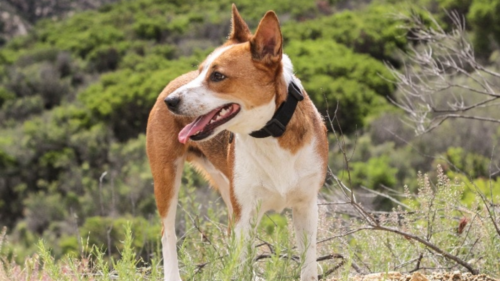
The Feist, a smaller but equally capable squirrel hunting breed, offers agility and enthusiasm in a compact package.
Key Characteristics:
- Size: Small to medium (10-30 pounds)
- Coat: Short and smooth
- Temperament: Energetic, alert, and fearless
Why Feists Excel at Squirrel Hunting:
Feists are renowned for their ability to navigate through thick underbrush and dense forest floors with ease. Their small size allows them to move quickly and quietly, often surprising squirrels before they can escape. These dogs possess a strong treeing instinct and are known for their distinctive, high-pitched bark when they've located their quarry.
Training Tips:
- Utilize their high energy for focused training sessions
- Incorporate play-based training to maintain engagement
- Expose them to various hunting environments early on
Pros:
- Excellent for hunting in dense, challenging terrains
- High energy and enthusiasm for the hunt
- Compact size makes them easy to transport and maintain
Cons:
- May be too small for some hunters' preferences
- Can be prone to chasing non-target wildlife if not properly trained
3. Treeing Walker Coonhound
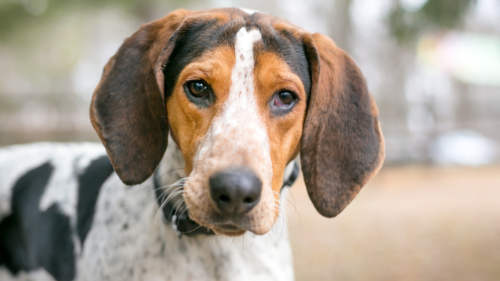
While primarily known for raccoon hunting, the Treeing Walker Coonhound has proven to be an exceptional squirrel hunting dog as well.
Key Characteristics:
- Size: Large (50-70 pounds)
- Coat: Short and smooth
- Temperament: Confident, sociable, and determined
Why Treeing Walker Coonhounds Excel at Squirrel Hunting:
These hounds possess an exceptional sense of smell and a powerful, melodious voice that carries well in the woods. Their stamina and endurance make them ideal for covering large hunting areas. Treeing Walker Coonhounds are known for their ability to “cold trail,” meaning they can pick up and follow old scent trails, a valuable skill in squirrel hunting.
Training Tips:
- Focus on scent training exercises to hone their tracking abilities
- Teach voice commands to control their loud baying
- Encourage their natural treeing instincts through positive reinforcement
Pros:
- Exceptional scenting abilities
- Loud, clear voice for signaling treed squirrels
- Versatile hunters capable of tracking various game
Cons:
- Their size may be challenging in very dense underbrush
- Loud voice might not be suitable for all hunting situations or locations
4. American Leopard Hound
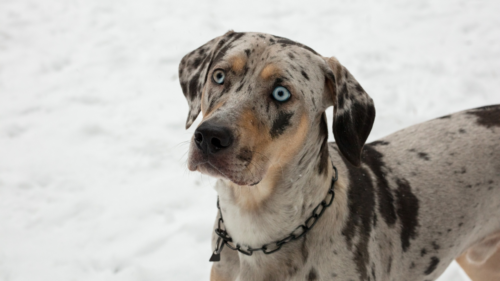
The American Leopard Hound, though less common, is gaining recognition as an excellent squirrel hunting breed.
Key Characteristics:
- Size: Medium to large (45-70 pounds)
- Coat: Short to medium, dense
- Temperament: Intelligent, adaptable, and family-friendly
Why American Leopard Hounds Excel at Squirrel Hunting:
These versatile dogs combine the tracking abilities of hounds with the agility needed for squirrel hunting. They have a strong prey drive and excellent stamina, allowing them to hunt effectively for extended periods. American Leopard Hounds are known for their “silent trailing” ability, meaning they can track quietly until they tree their quarry.
Training Tips:
- Capitalize on their intelligence with varied, engaging training sessions
- Introduce them to diverse hunting environments to build adaptability
- Reinforce their natural treeing instincts through structured exercises
Pros:
- Versatile hunters suitable for various game
- Silent trailing ability for stealthy hunting
- Good temperament for family life outside of hunting
Cons:
- May be challenging to find due to their relative rarity
- Can be independent thinkers, requiring patient and consistent training
5. Rat Terrier
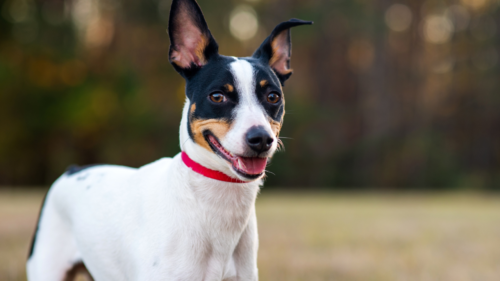
The Rat Terrier, originally bred for vermin control, has proven to be an adept and enthusiastic squirrel hunter.
Key Characteristics:
- Size: Small to medium (10-25 pounds)
- Coat: Short and smooth
- Temperament: Energetic, intelligent, and tenacious
Why Rat Terriers Excel at Squirrel Hunting:
Despite their small size, Rat Terriers possess a strong prey drive and excellent agility, making them formidable squirrel hunters. Their keen senses and quick reflexes allow them to track and tree squirrels efficiently. These dogs are known for their stamina and can hunt tirelessly for hours.
Training Tips:
- Harness their high energy with short, frequent training sessions
- Use their intelligence to teach complex commands and strategies
- Focus on recall training to ensure control in exciting hunting situations
Pros:
- Compact size ideal for navigating dense underbrush
- High energy and enthusiasm for the hunt
- Versatile dogs that can adapt to various hunting styles
Cons:
- May be too small for some hunters' preferences
- Strong prey drive can lead to chasing non-target animals if not properly trained
Choosing the Right Squirrel Hunting Dog for You
Selecting the perfect squirrel hunting dog depends on various factors, including your hunting style, terrain, and personal preferences. Consider the following when making your decision:
- Hunting Environment: Assess the typical terrain you'll be hunting in. Dense forests might favor smaller, more agile breeds like the Feist or Rat Terrier, while open woodlands could be suitable for larger dogs like the Mountain Cur or Treeing Walker Coonhound.
- Physical Capabilities: Consider your own physical fitness and the dog's energy levels. Ensure you can keep up with your chosen breed during long hunts.
- Training Commitment: Some breeds, like the Mountain Cur, may require more intensive training, while others, like the Rat Terrier, might be quicker to learn but need consistent reinforcement.
- Living Situation: Remember that your hunting dog is also a pet. Choose a breed that fits well with your lifestyle and living arrangements when not hunting.
- Hunting Style: Consider whether you prefer a dog that works closely with you or one that ranges farther afield. This can help narrow down your choices based on each breed's typical working style.
Training Your Squirrel Hunting Dog
Regardless of the breed you choose, proper training is crucial for developing a skilled squirrel hunting dog. Here are some general training tips:
- Start Early: Begin basic obedience training as soon as you bring your puppy home. This builds a strong foundation for more specialized hunting training.
- Scent Introduction: Familiarize your dog with squirrel scents early on. Use squirrel tails or scent products to create training scenarios.
- Treeing Practice: Encourage and reinforce your dog's natural treeing instincts. Use toys or scented objects placed in trees to simulate real hunting situations.
- Gunfire Acclimation: Gradually introduce your dog to the sound of gunfire to prevent gun shyness. Start with distant shots and slowly progress to closer ranges.
- Field Experience: Nothing beats real-world experience. Take your dog on frequent hunting trips, allowing them to learn and refine their skills in actual hunting environments.
- Positive Reinforcement: Use praise, treats, and play to reward desired behaviors. This builds your dog's confidence and strengthens your bond.
- Consistency: Maintain a consistent training schedule and use clear, consistent commands to avoid confusion.
Remember, every dog is unique, and training methods may need to be adjusted based on your dog's individual personality and learning style. Patience, consistency, and positive reinforcement are key to developing a skilled and enthusiastic squirrel hunting companion.


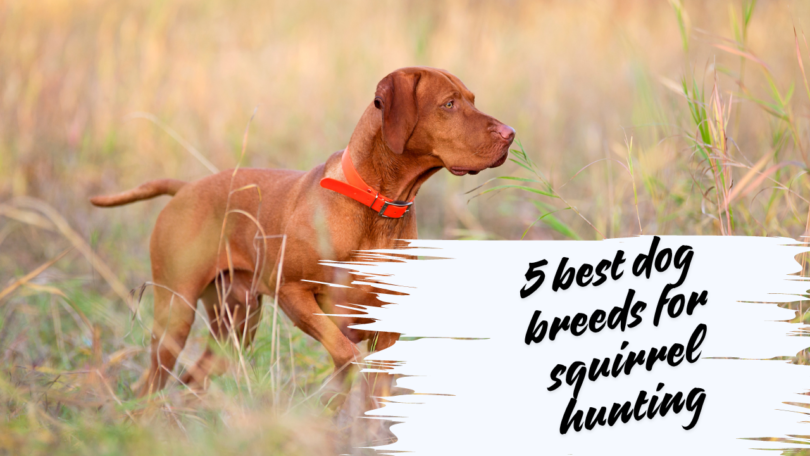

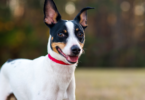



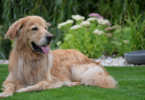

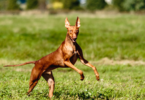
Leave a Comment